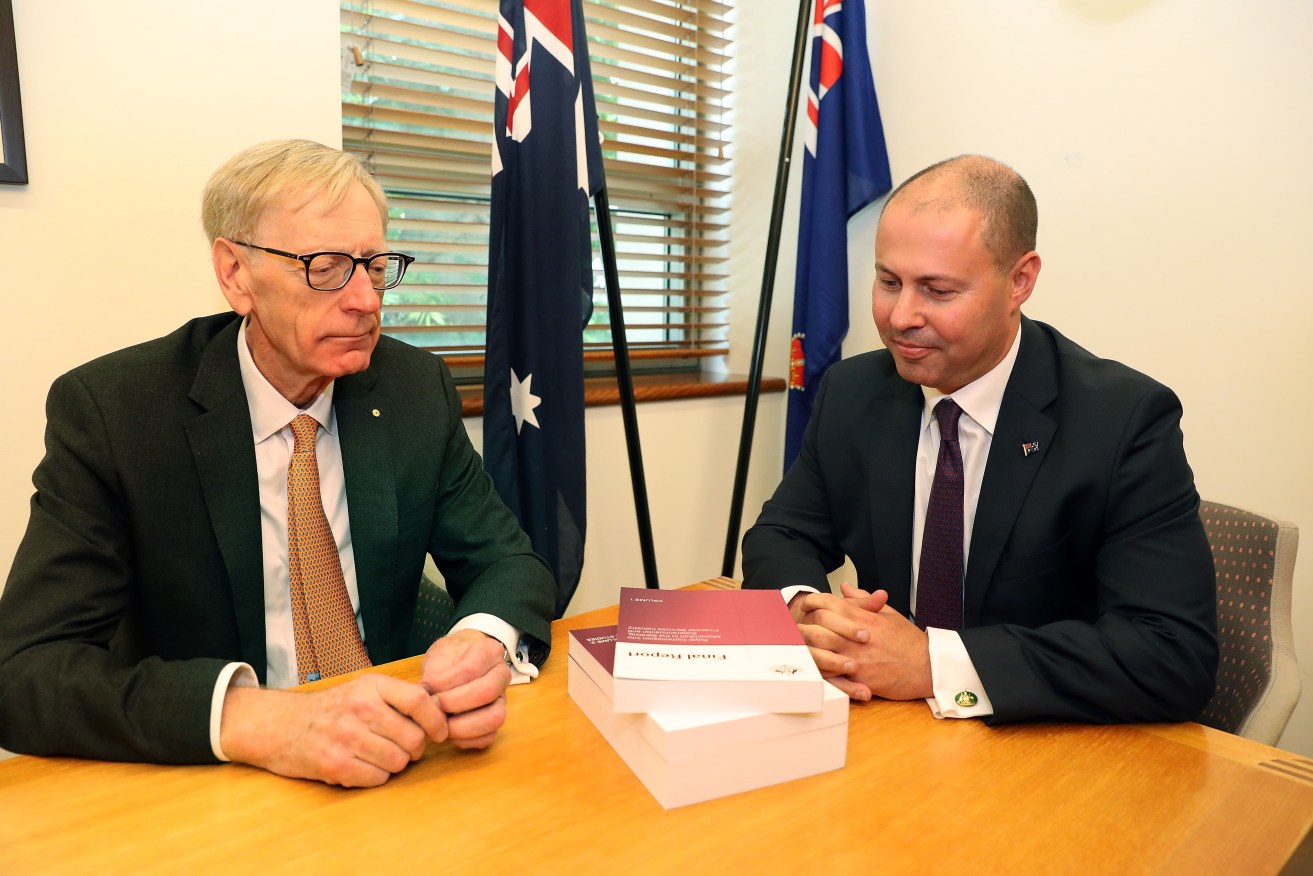Hayne’s prescription for ending banking rip-offs
Banking royal commissioner Kenneth Hayne QC wants wide-ranging reforms to stop the widespread misconduct that has caused substantial loss to customers while delivering hefty profits to the banks.

Banking royal commissioner Kenneth Hayne (left) with Treasurer Josh Frydenberg and a copy of his final report. Photo: AAP/Pool/Kym Smith
At least three unnamed institutions could face criminal dishonesty charges over the financial industry’s $1 billion fees-for-no-service scandal for “taking money for nothing”.
The banking, superannuation and wider financial services industry faces a top-to-bottom overhaul that could last for years.
Hayne knows there will be some who oppose his reforms, but says the time has come for action and the financial services industry is too important to the economy to allow past misconduct to continue or happen again.
In his final report, Hayne said those who opposed change would appeal to real or supposed difficulty in altering present arrangements.
Hayne said there could be no justification for the grandfathered commissions that allowed financial advisers to continue to receive some forms of otherwise banned conflicted remuneration.
He also called for changes in brokers’ remuneration, starting off with prohibiting lenders from paying trail commission to mortgage brokers for new loans.
“The chief value of trail commissions to the recipient, to put it bluntly, is that they are money for nothing,” he said.
“Why should a broker, whose work is complete when the loan is arranged, continue to benefit from the loan for years to come?”
Finance Brokers Association of Australia managing director Peter White said the elimination of trail commissions could force upfront fees to rise to compensate for reduced revenues to brokerages, which would lift interest rates.
Hayne’s final report said the primary responsibility for the misconduct lay with the banks and other financial services companies, their boards and senior executives.
He said some bank bosses seemed to be unwilling to recognise and accept responsibility for the poor conduct, singling out the National Australia Bank for the harshest criticism.
Australian Banking Association CEO Anna Bligh said the industry’s leaders accepted total and full responsibility for the failings.
“Let me be very clear: banks are determined to learn the lessons, to fix the problems and to make it right, and every part of the industry is as committed to that as any other,” she said.
Consumer groups said the increased consumer protections and removal of loopholes and exemptions would benefit everyday Australians.
Hayne sent 24 cases of superannuation and insurance conduct to the regulators, but as with his interim report did not formally refer matters already under investigation.
The government has promised action on the 76 recommendations and will give the regulators more resources, stronger powers and its own watchdog.
Hayne’s assessment
On bank culture:
“Failings of organisational culture, governance arrangements and remuneration systems lie at the heart of much of the misconduct examined in this commission.”
On greed:
“In almost every case, the conduct in issue was driven not only by the relevant entity’s pursuit of profit but also by individuals’ pursuit of gain, whether in the form of remuneration for the individual or profit for the individual’s business. Providing a service to customers was relegated to second place. ”
On power:
“There was a marked imbalance of power and knowledge between those providing the product or service and those acquiring it.”
On brokers and intermediaries:
“An intermediary who seeks to ‘stand in more than one canoe’ cannot. Duty (to client) and (self) interest pull in opposite directions. ”
On crime and punishment:
“Misconduct will be deterred only if entities believe that misconduct will be detected, denounced and justly punished. Misconduct is not deterred by requiring those who are found to have done wrong to do no more than pay compensation. And wrongdoing is not denounced by issuing a media release.”
On saying sorry:
“Saying sorry and promising not to do it again has not prevented recurrence. The time has come to decide what is to be done in response to what has happened. The financial services industry is too important to the economy of the nation to allow what has happened in the past to continue or to happen again.”
On NAB (singled out for its poor response):
“My fear – that there may be a wide gap between the public face NAB seeks to show and what it does in practice – remains.”
– AAP




